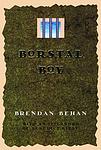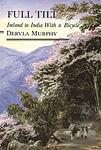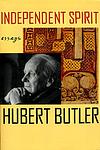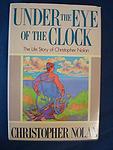The Greatest Irish, Austrian "Nonfiction" Books Since 1950
Click to learn how this list is calculated.
This list represents a comprehensive and trusted collection of the greatest books. Developed through a specialized algorithm, it brings together 300 'best of' book lists to form a definitive guide to the world's most acclaimed books. For those interested in how these books are chosen, additional details can be found on the rankings page.
Genres
Countries
Date Range
Reading Statistics
Click the button below to see how many of these books you've read!
Download
If you're interested in downloading this list as a CSV file for use in a spreadsheet application, you can easily do so by clicking the button below. Please note that to ensure a manageable file size and faster download, the CSV will include details for only the first 500 books.
Download-
1. Philosophical Investigations by Ludwig Wittgenstein
This book is a seminal work in 20th-century philosophy, presenting a detailed critique of the notion that our language directly corresponds to reality. The author argues that the meaning of words is not inherent, but rather derives from their use within specific forms of life. The book also introduces the concept of language games, suggesting that our understanding of language is akin to learning the rules of a game. The author further explores the limits of language, the nature of understanding, and the relationship between public and private language.
-
2. The Constitution of Liberty by Friedrich von Hayek
This book is a comprehensive analysis of the concept of liberty, emphasizing the importance of individual freedom in political, societal, and economic contexts. The author argues that a free society, where individuals can act according to their own decisions and plans, is the most effective system for human progress. He also explores the relationship between law and liberty, the role of government in a free society, and the challenges to liberty posed by concepts such as social and economic justice.
-
3. The Uses of Enchantment by Bruno Bettelheim
"The Uses of Enchantment" is a psychological analysis of fairy tales and their importance in childhood development. The book argues that these stories allow children to navigate their emotions and understand aspects of life they are yet to experience. By exploring various themes, such as separation anxiety, oedipal conflict, and sibling rivalry, through well-known fairy tales, the author demonstrates how these narratives contribute to a child's moral education and understanding of the human nature.
-
4. On Aggression by Konrad Lorenz
"On Aggression" is a scientific study that explores the concept of aggression in both animals and humans from an ethological (study of animal behavior) perspective. The author argues that aggression is an innate and necessary instinct that has helped species survive and evolve. However, he also emphasizes that this instinct, when unchecked or misdirected, can lead to destructive behavior and violence. The book provides a comprehensive analysis of the biological roots of aggression, its role in the evolution and survival of species, and its implications for human society.
-
5. Seven Years in Tibet by Heinrich Harrer
This book is a travel memoir that recounts the author's escape from a British internment camp in India during World War II and his subsequent journey through the Himalayas to Tibet, where he becomes a tutor and friend to the Dalai Lama. The book provides a detailed account of Tibetan culture, customs, and the political turmoil leading up to the Chinese invasion, as seen through the eyes of a foreigner who spent seven years living there.
-
6. The Tao of Physics by Fritjof Capra
The book explores the parallels between modern physics and eastern mysticism. It draws connections between quantum mechanics, relativity theory and concepts in Hinduism, Buddhism, Taoism, and Zen. The author argues that the two seemingly disparate areas of study - physics and mysticism - both seek to understand the fundamental nature of the universe and that they do so in strikingly similar ways. The book challenges conventional thinking and encourages readers to see the world from a more holistic, interconnected perspective.
-
7. Borstal Boy by Brendan Behan
"Borstal Boy" is a semi-autobiographical novel that depicts the author's experiences in a British juvenile detention center, or borstal, during World War II. The young protagonist is arrested in Liverpool for his involvement with the Irish Republican Army and is sent to borstal where he spends his formative years. The narrative explores themes of patriotism, identity, and the complexities of adolescence, presenting a raw and compelling portrayal of life in detention and the relationships formed there.
-
8. Three Case Histories by Sigmund Freud
"Three Case Histories" is a compilation of three of the most famous case studies by a renowned psychoanalyst, exploring the complexities of the human mind. The book includes the cases of 'Little Hans', a boy with a phobia of horses, 'The Rat Man', an obsessive-compulsive patient, and 'The Wolf Man', a wealthy Russian aristocrat suffering from a variety of psychoneurotic symptoms. The author uses these cases to demonstrate his theories on psychoanalysis, childhood sexuality, the interpretation of dreams, and the subconscious.
-
9. Wittgenstein's Nephew by Thomas Bernhard
"Wittgenstein's Nephew" is a semi-autobiographical novel that explores the friendship between the narrator and his friend Paul, who is the nephew of the famous philosopher Ludwig Wittgenstein. The story takes place in Vienna and is set against the backdrop of the Austrian mental health system. The novel delves into themes of sanity, insanity, and the fine line that separates the two, while also offering a critique of Austrian society. It is a meditation on the nature of illness, both physical and mental, and the impact it has on personal relationships and one's perception of the world.
-
10. Tongue Set Free by Elias Canetti
"Tongue Set Free" is a captivating memoir that explores the author's personal journey of self-discovery and identity formation. Through vivid and introspective storytelling, the book delves into the complexities of Canetti's multicultural upbringing, his struggles with language and communication, and his quest for freedom and belonging. With poetic prose and profound insights, the author reflects on the power of words, the influence of cultural heritage, and the transformative nature of embracing one's true self.
-
11. The New Science of Politics by Eric Voegelin
"The New Science of Politics" is a seminal work in political philosophy that explores the nature of political societies, the symbolism of political power, and the essence of modernity. It delves into the evolution of political thought, from ancient civilizations to the modern era, and critically examines the ideologies that have shaped the contemporary political landscape. The author argues that understanding the spiritual and religious dimensions of political reality can provide a more comprehensive view of society and governance. The book is a profound meditation on the philosophy of history and a radical critique of modern political ideologies.
-
12. Selected Stories by William Trevor
"Selected Stories" is a collection of short stories by acclaimed author William Trevor. The book features some of Trevor's most memorable and haunting tales, exploring themes of love, loss, and the complexities of human relationships. With his signature style of understated elegance and quiet, observant prose, Trevor creates characters that are both ordinary and extraordinary, capturing the subtle nuances of their lives and the emotions that drive them. From the Irish countryside to London's bustling streets, these stories offer a glimpse into the human experience and the ways in which we navigate the world around us.
-
13. We Don’t Know Ourselves by Fintan O'Toole
"We Don't Know Ourselves" by Fintan O'Toole is a collection of essays that explores the current state of Ireland and its people. O'Toole argues that Ireland's sense of identity has been shaped by its history of colonization and the struggle for independence, but that this identity is now being challenged by globalization and the changing social and economic landscape. He examines issues such as immigration, the Catholic Church's declining influence, and the rise of nationalism, and ultimately argues that Ireland needs to embrace a new sense of identity that is inclusive and forward-thinking.
-
14. A Fanatic Heart by Edna O'Brien
"A Fanatic Heart" is a collection of short stories that delve into the complexities of human emotions and relationships, often set against the backdrop of Ireland's lush landscapes and social upheavals. The narratives explore themes of love, betrayal, and the struggles of the human spirit through a variety of characters, from young girls to aging men, each grappling with their own desires, regrets, and search for meaning. The author's lyrical prose and keen insight into the intricacies of the heart and society weave together tales that are both poignant and revealing, offering a window into the soul of her characters and the cultural tensions of the time.
-
15. Poems Of Paul Muldoon by Paul Muldoon
This collection showcases the work of a contemporary poet known for his wit, wordplay, and innovation in form and technique. The poems span a variety of themes, from personal reflection to broader cultural commentary, often with a sense of the historical and mythical interwoven with the everyday. The poet's Irish heritage and experiences inform much of his work, which is characterized by its musicality, linguistic dexterity, and a playful yet profound engagement with language. The collection serves as a testament to the poet's reputation as a master craftsman of verse, capable of both depth and lightness, with a distinctive voice that has influenced modern poetry.
-
16. Full Tilt by Dervla Murphy
"Full Tilt" is a captivating travelogue that documents the author's adventurous bicycle journey from Ireland to India. The journey is filled with diverse landscapes, cultures, and people, as well as several challenges, including harsh weather conditions, illness, and political unrest. The author's resilience, determination, and passion for exploration are evident throughout the book, providing an inspiring and insightful perspective on solo travel and self-discovery.
-
17. The Complete Letters Of Oscar Wilde by Oscar Wilde
This compilation is an exhaustive collection of correspondence penned by one of the most celebrated writers of the Victorian era, known for his wit, eloquence, and flamboyant style. The letters provide an intimate glimpse into the author's life, covering his rise to fame, his relationships, his trials, and his time in prison. They reveal his personal thoughts on art, literature, society, and his own creative process. The collection is not only a treasure trove for literary enthusiasts and scholars but also a poignant, revealing portrait of a complex man who was a central figure in the aesthetic movement of the late 19th century.
-
18. Independent Spirit by Hubert Butler
"Independent Spirit" is a collection of essays that delve into the rich tapestry of European history, politics, and culture through the discerning eyes of an Irish essayist. The book reflects on various topics ranging from the author's experiences in the Balkans to the complex interplay of religion and nationalism in Ireland. With a keen analytical mind and a profound moral sense, the essays explore the importance of maintaining cultural identity and historical awareness in the face of modern challenges, advocating for intellectual independence and the preservation of human rights. The author's eloquent prose and insightful observations make this work a compelling exploration of Europe's past and present.
-
19. Under the Eye of the Clock by Christopher Nolan
This novel is a semi-autobiographical account of a young man with cerebral palsy who uses his intelligence and determination to overcome his physical disability. Despite being unable to speak or move without assistance, the protagonist excels academically, eventually earning a place at a prestigious university. The book is a testament to the power of the human spirit and the potential within us all to rise above our limitations.
Reading Statistics
Click the button below to see how many of these books you've read!
Download
If you're interested in downloading this list as a CSV file for use in a spreadsheet application, you can easily do so by clicking the button below. Please note that to ensure a manageable file size and faster download, the CSV will include details for only the first 500 books.
Download

















